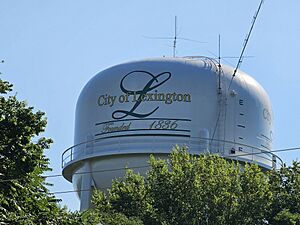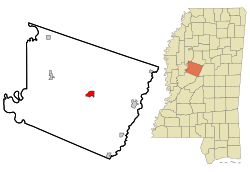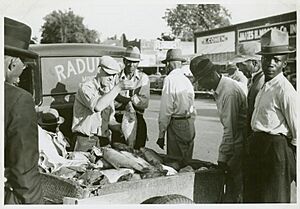Lexington, Mississippi facts for kids
Quick facts for kids
Lexington, Mississippi
|
||
|---|---|---|
 |
||
|
||

Location of Lexington, Mississippi
|
||
| Country | United States | |
| State | Mississippi | |
| County | Holmes | |
| Area | ||
| • Total | 2.42 sq mi (6.27 km2) | |
| • Land | 2.42 sq mi (6.26 km2) | |
| • Water | 0.00 sq mi (0.01 km2) | |
| Elevation | 233 ft (71 m) | |
| Population
(2020)
|
||
| • Total | 1,602 | |
| • Density | 662.81/sq mi (255.86/km2) | |
| Time zone | UTC-6 (Central (CST)) | |
| • Summer (DST) | UTC-5 (CDT) | |
| ZIP code |
39095
|
|
| Area code(s) | 662 | |
| FIPS code | 28-40600 | |
| GNIS feature ID | 0672434 | |
Lexington is a city in Holmes County, Mississippi, United States. It is also the county seat, which means it's where the main government offices for the county are located. The county was formed in 1833, and Lexington became a city in 1836. In 2020, about 1,602 people lived there. The city's population has changed over time, partly because of big changes in farming.
Contents
History of Lexington
Early Days and Growth
Lexington was officially made a city in 1836. It was founded by European-American settlers. Before this, the Choctaw people lived in the area for a long time. They were later asked to give up their land to the United States.
The new settlers started large cotton farms along the Yazoo and Black rivers. These farms mostly used the forced labor of enslaved African Americans. These enslaved people were brought from other parts of the country. Many African American families were separated during this time. Soon, enslaved people made up most of the population in Holmes County.
Lexington became an important trading center for the county. Many people came to town on court days. In the 1840s, some German-Jewish immigrants moved to Lexington and became merchants. Later, Russian Jewish immigrants also joined them. The Jewish community built a special building called Temple Beth El in 1905. It closed in 2009 because fewer people lived there. During the time of large cotton farms, the city was very busy. Farmers made a lot of money because there was a high demand for cotton.
Jacob Sontheimer, a German-Jewish immigrant, was one of the early settlers in the 1840s. He started as a merchant. His daughters, Rose and Bettie, later took over the family business. Other Jewish immigrants also came to Lexington. They started businesses like tailoring and grocery stores. The Lewis Grocery Store grew into a very large wholesale business in Mississippi.
After the Civil War
After the Civil War, formerly enslaved people in Holmes County became free. They made up most of the population. Many joined the Republican Party. They elected several local leaders, like county sheriffs. They also worked to get an education and buy land.
However, around 1890, the state government passed new laws. These laws made it very hard for African Americans to vote. This meant they could not be part of politics for many decades. Also, money problems and a lack of political power caused many African Americans to lose their land. They often became sharecroppers or tenant farmers, working on land owned by others.
20th Century and Beyond

Edmund F. Noel was a lawyer from Lexington. His family had large cotton farms. He became a politician and was elected governor of Mississippi from 1906 to 1912. His house in Lexington is famous for its unique design.
In the early 1900s, some Chinese immigrant workers came to Mississippi to help with farm labor. However, the cotton crops faced problems from a bug called the boll weevil. Also, new machines meant fewer people were needed to work on farms. This caused the population of the county and town to shrink from the 1930s onward. Many African Americans moved away from the South. They went to cities in the North and Midwest. They were looking for better jobs and to escape unfair rules and violence.
Lexington is known for two important women. Arenia Mallory, an African-American music teacher, started teaching at Saints Academy in Lexington in 1926. This school was for African-American students. She led the school for over 50 years, making it a place of excellent learning. She even started a junior college there. In the 1960s, President John F. Kennedy asked her to serve on national committees.
Hazel Brannon Smith was a white woman from Lexington. She owned and published several local newspapers. During the Civil Rights Movement, she supported fairness and change. She won a special award called a Pulitzer Prize in 1964 for her newspaper articles. This was a time when African Americans were working hard for their voting rights.
In September 2024, the US Department of Justice looked into the City of Lexington and its police department. They found that there were problems, including unfair arrests and using fines that hurt Black residents and those with less money. The Department of Justice made suggestions to help the police department improve.
Geography and Climate
Lexington is located in the middle of Holmes County. It is near Black Creek, which flows into the Yazoo River. Two main roads, Mississippi Highways 12 and 17, go through the city.
The city covers about 6.3 square kilometers (2.4 square miles). Most of this area is land, with a small amount of water.
Lexington has a humid subtropical climate. This means it has hot, humid summers and winters that are usually mild to cool. This type of climate is common in the southern United States.
Population Information
The population of Lexington has changed a lot over the years. There were big drops in population from 1910 to 1920, and again after 1960. These changes happened when farming became more mechanized. Also, many African Americans moved away during the Great Migration. They were looking for better jobs and to escape unfair laws.
| Historical population | |||
|---|---|---|---|
| Census | Pop. | %± | |
| 1850 | 656 | — | |
| 1860 | 887 | 35.2% | |
| 1870 | 744 | −16.1% | |
| 1880 | 798 | 7.3% | |
| 1890 | 1,075 | 34.7% | |
| 1900 | 1,516 | 41.0% | |
| 1910 | 2,428 | 60.2% | |
| 1920 | 1,792 | −26.2% | |
| 1930 | 2,590 | 44.5% | |
| 1940 | 2,930 | 13.1% | |
| 1950 | 3,198 | 9.1% | |
| 1960 | 2,839 | −11.2% | |
| 1970 | 2,756 | −2.9% | |
| 1980 | 2,628 | −4.6% | |
| 1990 | 2,227 | −15.3% | |
| 2000 | 2,025 | −9.1% | |
| 2010 | 1,731 | −14.5% | |
| 2020 | 1,602 | −7.5% | |
| U.S. Decennial Census | |||
Population in 2020
In 2020, there were 1,602 people living in Lexington. There were 545 households and 363 families.
| Race | Num. | Perc. |
|---|---|---|
| White | 281 | 17.54% |
| Black or African American | 1,278 | 79.78% |
| Asian | 9 | 0.56% |
| Other/Mixed | 33 | 2.06% |
| Hispanic or Latino | 1 | 0.06% |
Population in 2010
In 2010, the people living in Lexington were:
- 71.8% Black or African American
- 27.0% White
- 0.5% Asian
- 0.5% from two or more races
- 0.1% American Indian
Population in 2000
In 2000, there were 2,025 people, 725 households, and 503 families in the city. The average household had about 2.70 people. The average family had about 3.34 people.
The population was spread out by age:
- 28.5% were under 18
- 11.1% were 18 to 24
- 26.9% were 25 to 44
- 17.9% were 45 to 64
- 15.7% were 65 or older
The median age was 35 years. The median income for a household was $22,163. About 37.2% of the population lived below the poverty line.
Education in Lexington
The Holmes County School District serves the city of Lexington. William Dean Jr. Elementary School and Holmes County Central High School are located in the area.
Lexington was also home to Saints Academy. This private school for African-American students was started in 1918. Arenia Mallory became its principal and president. She helped the school grow and set high academic standards. The school became well-known for providing great opportunities to Black students.
Notable People from Lexington
Many interesting people have connections to Lexington:
- Chalmers Archer – An author and U.S. Special Forces veteran.
- John C. Black – A member of the U.S. House of Representatives and a Medal of Honor recipient.
- Lee Cooper – A blues guitarist.
- Minnie M. Cox – A postmaster and teacher.
- Leonard B. Cresswell – A major general in the United States Marine Corps.
- Buford Ellington – A former Governor of Tennessee.
- Malachi Favors – A jazz bassist.
- Jill Collen Jefferson – An African American civil rights attorney and activist.
- B.B. King – A famous musician who lived in Lexington for a time.
- Ronald Kirklin – A Quartermaster General for the U.S. Army.
- John R. Land – A Justice on the Louisiana Supreme Court.
- Alexander Lane – An Illinois state representative and physician.
- Arenia Mallory – An African-American educator and activist.
- Charles Harrison Mason – The founder of the Church of God in Christ.
- Melany Neilson – An author.
- William Nichols – An architect.
- Edmond Favor Noel – A former Governor of Mississippi.
- Milton L. Olive III – A U.S. Army Soldier and Medal of Honor recipient.
- Lonnie Pitchford – A blues musician.
- Monroe Saffold Jr. – An American bodybuilder.
- Hazel Brannon Smith – A newspaper owner and publisher who won a Pulitzer Prize.
- Otis "Big Smokey" Smothers – A Chicago blues guitarist.
- Neely Tucker – A journalist and author.
- Willie West – A former National Football League player.
- Hattie Winston – An actress in television, film, and theatre.
See also
 In Spanish: Lexington (Misisipi) para niños
In Spanish: Lexington (Misisipi) para niños
- Lexington Historic District
 | Georgia Louise Harris Brown |
 | Julian Abele |
 | Norma Merrick Sklarek |
 | William Sidney Pittman |



